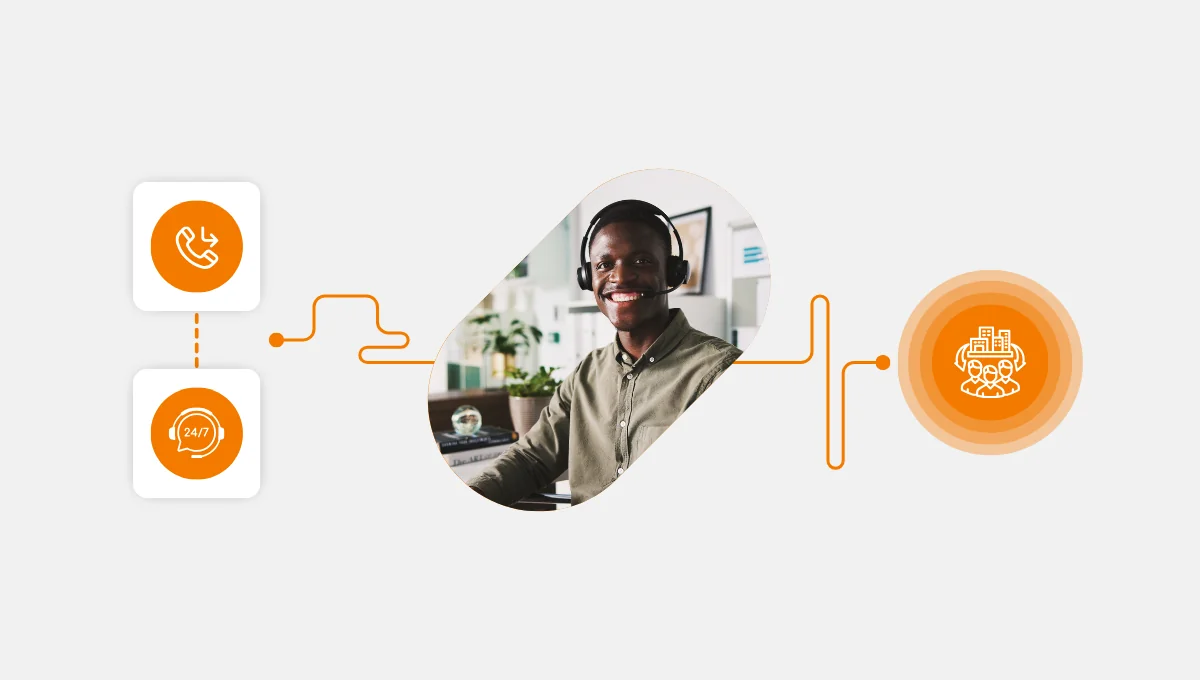Cloud call center software is created to manage high numbers of both incoming and outgoing phone calls on behalf of a business or organization. Customer assistance, technical support, telemarketing, and market research are just a few uses for call centers.
Agents in call centers are trained to take calls with professionalism and courtesy and to help callers as soon and effectively as possible. To help them with their work, call center employees may use various technologies and tools, including knowledge bases, call routing software, and customer relationship management software.
Any call center operation’s success depends on efficient call center administration. Key performance indicators including average handling time, initial call resolution, and customer satisfaction, are routinely used to gauge how well a call center studio performs.
New technology and trends enter the customer service industry every year. With the use of artificial intelligence (AI) leading the way, we anticipate that the usage of AI in contact centers will continue to rise in 2023, along with other trends that will influence how businesses communicate with their clients. These will be explored below.

Contact Center Trends in 2022
Before we look ahead to 2023, let’s quickly review some of the trends from 2022 that we anticipate to continue before moving on to those for 2023.
The deployment of cloud-based contact center systems is expected to continue to be implemented. Contact centers adopt the cloud as more businesses do, giving them the flexibility and scalability to grow as needed.
A strong emphasis on the employee experience in contact centers is another trend that we predict will persist. Because contact centers have high turnover rates, businesses are always seeking ways to increase retention by spending money on employee training and development.
Contact Center Trends for 2023
We anticipate several changes that will influence the direction of customer service in 2023. The ongoing expansion of AI in contact centers is expected be one of the most important trends. AI has advanced significantly, with chatbots and virtual assistants becoming more widespread. We anticipate the development of increasingly more sophisticated AI applications in 2023, which may include speech recognition and sentiment analysis, to deliver individualized consumer experiences.
In 2023, we also anticipate a rise in the use of self-service solutions. More and more evidence has shown that customers prefer finding solutions independently versus waiting in line for a professional. To accommodate this need, businesses must make investments in self-service options like knowledge bases and chatbots like ChatGPT.
In addition to AI and self-service, we anticipate that in 2023, more businesses will adopt omni-channel communication. To reach customers where they are, businesses must have a variety of contact channels besides phone and email, such as social media and messaging apps.
AI and Customer Service for 2023
As was already mentioned, the future of customer service will be significantly influenced by AI. The capacity of AI to deliver tailored experiences at scale is one of its main advantages. AI can foresee a consumer’s requirements by evaluating customer data and presenting pertinent information or offers, ultimately increasing client satisfaction and loyalty.
Automation is another way that AI will change customer service. Representatives can focus on more complex tasks, which require human engagement by automating routine tasks like data entry and booking appointments.
Will AI Play a Greater Role in Customer Service in 2023?
In short: yes. In 2023, AI is expected to have an even bigger impact on customer service. We anticipate seeing more complex applications utilized in contact centers as AI technology develops. For instance, speech recognition technology will allow customers to communicate with contact centers in new ways, and AI-powered chatbots are expected to become increasingly reliable at addressing complex customer inquiries.
It’s crucial to remember that AI will not completely replace human representatives. The human connection will always be necessary for certain circumstances, such as complex problem-solving or emotional support. Instead, human representatives will be complemented by AI, freeing them up to concentrate on higher-value duties.
What Is the Future of Contact Centers?
Modern organizations that depend on customer service to prosper need call center software. This software can automate several processes including call routing and recording, which improves productivity and allows agents to work on other important tasks.
In addition, call center software can be integrated with customer relationship management applications to give operators access to consumer data, personalize services, and deal with problems more quickly.
The Cost Will Decrease
Call center software also reduces costs. Staffing levels can be optimized, and first-call resolution rates will rise, increasing customer satisfaction and retention rates. Call center software also creates reports on important performance metrics, giving users insights to help them decide what to do and how to enhance operations. Because call center software is flexible and scalable, organizations can satisfy client requests and stay one step ahead of the competition.
Adopting New Technologies
Call centers must adopt new technologies and approaches in the upcoming years to keep up with shifting client expectations. Examples of these are: offering self-service choices, omni-channel communication, and investing in AI and automation.
However, call centers’ employees also have an impact on the business’s future. As previously noted, employee experience was a major trend in 2022 and is likely to continue in to 2023. To increase retention and encourage a great work environment for employees, businesses will need to engage in training and development initiatives to support employees.
Data Security and Privacy
Data security and privacy are significant factors in the future of call centers. Call centers will need to ensure they are adhering to best practices for data protection and compliance due to growing concerns over data breaches and privacy violations.
Changing Customer Needs and Preferences
The future of call centers will depend on the ability to adapt to changing customer needs and preferences. As new communication channels and technologies emerge, call centers must be agile and responsive to stay ahead of the curve.
Call centers’ ability to evolve with customers’ demands and tastes will determine their future. Call centers must be flexible and responsive to stay at the cutting edge of new communication methods and technology which are introduced.
Final Impression
New technologies and trends regularly emerge, causing the contact center industry to change constantly. We anticipate that cloud call center software and AI will continue to develop in 2023 and that self-service and omni-channel communication will receive more attention. Companies that invest in these trends and prioritize employee experience and data protection will be well-positioned for success in the future.




